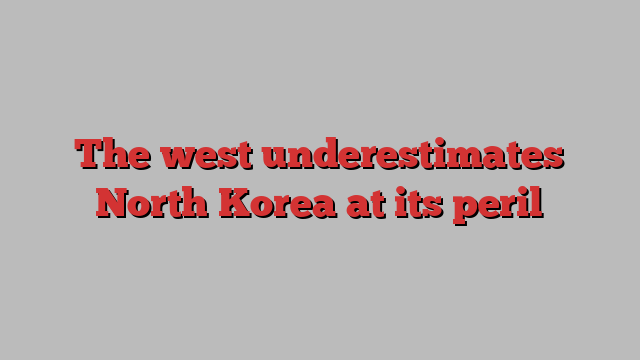
Unlock the US Election Countdown newsletter for free
The stories that matter on money and politics in the race for the White House
“The first step to a world war”. That was how Volodymyr Zelenskyy described the anticipated arrival of North Korean troops on the front lines of the Russia-Ukraine conflict.
Western security officials have warned for months of growing co-operation between an “axis of adversaries”, made up of Russia, North Korea, Iran and China. North Korean support for Russia is the most dramatic evidence yet of that axis in action.
Of the four adversaries, North Korea has received the least attention in the west. The country slipped out of the headlines after the attempted rapprochement between Donald Trump and Kim Jong Un, the North Korean dictator, failed in 2019.
However, specialists on North Korea have been sounding the alarm for months. In January, two leading North Korea watchers, Robert Carlin and Siegfried Hecker, warned: “Kim Jong Un has made a strategic decision to go to war.”
Carlin ran the US State Department team working on North Korea for decades and Hecker is a former head of the Los Alamos laboratory. Both men have visited North Korea many times. In their joint article, they warned that Kim has abandoned his effort to improve relations with America, in favour of a policy of confrontation with South Korea and the US. They concluded bleakly: “North Korea has a large nuclear arsenal . . . of potentially 50 or 60 warheads . . . [Kim’s] recent words and actions point toward the prospects of a military solution using that arsenal.”
Over the course of the year, the signs of a radicalisation in North Korean policy have proliferated. In June, Russia and North Korea signed a mutual defence pact. North Korea has also formally abandoned the goal of eventual reunification with the south and instead designated South Korea as an irreconcilable enemy. In recent weeks, Pyongyang has also blown up roads linking the two Koreas.
Like Xi and Putin, Kim Jong Un seems to be convinced that the US is in long-term decline. He may sense a historic opportunity to prevail over his enemies, as part of a broader global realignment that Xi has hailed as “great changes unseen in a century”.
China is said to be uneasy about the growing closeness between Russia and North Korea, which reduces Beijing’s leverage over both countries. But it remains a treaty ally of North Korea — which China still regards as a crucial buffer against the US in Asia.
The Chinese also know that rising tensions on the Korean peninsula may make it harder for the US to defend Taiwan. Many of the same US military resources are pledged to the defence of both Taiwan and South Korea. Indeed some Washington analysts are already speculating about the possibility of simultaneous conflicts on the Korean peninsula and the Taiwan Strait.
There has been an unfortunate tendency in the west to treat North Korea as a joke — a land of ill-fitting suits and bad haircuts that is more likely to launch a comic meme than a nuclear weapon.
As well as minimising the suffering of the North Korean people, treating the Kim regime as a joke seriously underestimates its capabilities. Poverty in North Korea does not mean that the regime is backward in every respect. Instead, it testifies to Kim’s utter disregard for the welfare of ordinary people, in favour of military development. Despite the regime’s isolation it has succeeded in building nuclear weapons — something that richer and better-connected countries such as Iran and Syria have failed to achieve. The North Koreans have also developed ballistic missiles and considerable offensive cyber capabilities.
Kim has already delivered millions of shells to Russia, which have given Putin’s regime an advantage in its artillery war with Ukraine. Now North Korean troops seem poised to enter the fight. Initial western speculation is that they may operate inside Russia itself — perhaps taking on the Ukrainian forces that have occupied parts of the Kursk region or merely operating in support roles.
But western analysis has consistently underestimated the radicalism and aggression of both Putin and Kim. So there can be no guarantee that the North Koreans will not also join Russia’s offensive inside Ukraine itself.
In a war, in which over 600,000 Russian troops are believed to have been killed or wounded, the arrival of 10,000 or so North Korean special forces would be unlikely to tip the balance. But the country has 1.3mn active military personnel, the fourth largest force in the world. The bulk of those are ill-trained and ill-equipped recruits. But Putin could always use more cannon fodder for his “meat-grinder” offensives.
And what is in it for Kim? Current speculation centres on technology transfer and money from Russia. But the North Korean leader may also be looking ahead to a possible future conflict on the Korean peninsula. If he backs Russia in a European war, might Russia one day return the favour in an Asian conflict?
All of this poses very difficult questions for the US, the EU and South Korea. They have all sought to avoid escalation, both in Ukraine and on the Korean peninsula. But they may soon face a choice. Allow Russia to defeat Ukraine with North Korean assistance — and then contemplate the changed security picture in Europe and Asia. Or sharply increase their own support for Ukraine and their willingness to take risks in confronting an axis of adversaries.